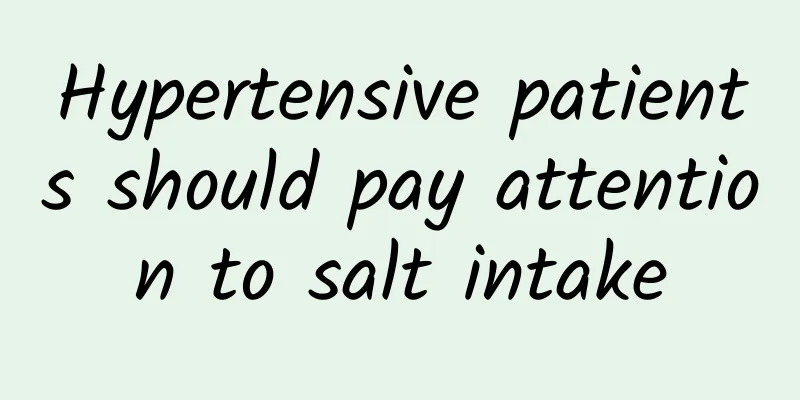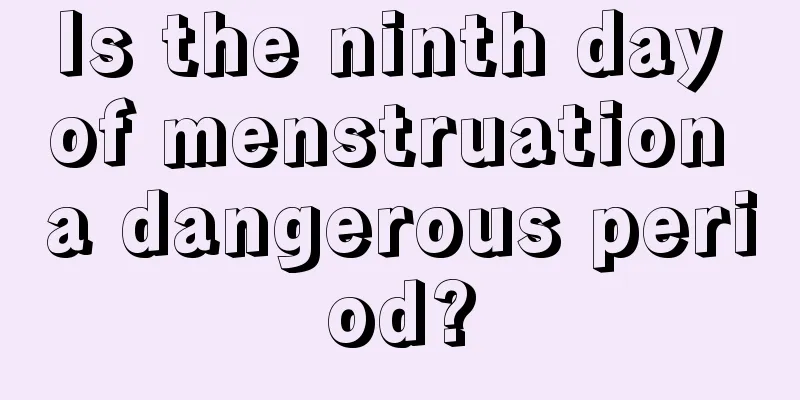Hypertensive patients should pay attention to salt intake

|
Author: Zhao Xia Xuanwu Hospital, Capital Medical University Reviewer: Xia Jinggang, Chief Physician, Xuanwu Hospital, Capital Medical University Figure 1 Copyright image, no permission to reprint Hypertension is a common cardiovascular disease. If it is not controlled in time, it will increase the risk of damage to the heart, cerebral blood vessels, kidneys and other organs. Dietary management is very important for patients with hypertension, and the most critical point is to control salt intake. So, what are the precautions for hypertensive patients to eat salt? First of all, patients with hypertension should reduce their salt intake, and it is generally recommended not to exceed 5 grams per day. Too much salt will increase the body's water content, increase blood volume and blood pressure. At the same time, we should also pay attention to avoid the intake of hidden salt, such as soy sauce, vinegar, MSG, pickles, pickles, ham, bacon and other foods with high salt content. Secondly, patients with hypertension should choose low-sodium salt or sodium-free salt instead of ordinary table salt. Low-sodium salt or sodium-free salt replaces part or all of the sodium with other minerals such as potassium or magnesium, which can reduce the impact of sodium on blood pressure. However, not all patients with hypertension are suitable for low-sodium salt or sodium-free salt. For example, patients with renal insufficiency or taking diuretics and other drugs should use it under the guidance of a doctor. Finally, patients with hypertension should appropriately increase their intake of minerals such as calcium, magnesium, and potassium. These minerals can help regulate the body's water balance and vascular tension, and have a certain effect on lowering blood pressure. Foods rich in these minerals include milk, soy products, nuts, green leafy vegetables, bananas, citrus fruits, etc. Figure 2 Copyright image, no permission to reprint Tips for controlling salt in daily life 1. Reduce the number of times you eat out and eat takeout: Most food prepared in restaurants has a high salt content. When dining out or ordering takeout, you should actively request low-salt flavors, give priority to low-salt dishes, and try to reduce the frequency. Figure 3 Copyright image, no permission to reprint 2. Reduce salt intake gradually: Use a salt-limiting spoon or beer bottle cap to control salt. A full beer bottle cap (without the rubber pad) contains about 6 grams of salt. Add a little less salt each time you cook, gradually reducing salt intake, and eventually reaching a salt level of 5 grams per day. 3. Add salt when the dish is out of the pot: When adding salt later, the salt adheres to the surface of the dish. Use less salt than adding salt earlier, and the saltiness of the taste is basically the same. Figure 4 Copyright image, no permission to reprint 4. Use more vinegar, lemon juice, chili, onion, ginger, garlic, tomatoes and other seasonings when cooking to reduce salt intake. Figure 5 Copyright image, no permission to reprint 5. Eat less smoked, pickled foods and snacks, as these foods are mostly high in salt. Check the labels when purchasing food and refuse high-salt foods. Figure 6 Copyrighted images are not authorized for reproduction In short, patients with hypertension need to eat less salt, choose the right salt, and cooperate with others in order to effectively control blood pressure and protect cardiovascular health. |
<<: What is lymphoma? A brief introduction to lymphoma
Recommend
Signs of twins after IVF
For many infertile couples, the best way to conce...
How long does it take for my period to end?
Women will have their periods when they reach a c...
Is it good to grow flowers in pots? Why does it leak when growing flowers in pots?
With the improvement of living standards, more an...
Picture of three months of pregnancy
It is not difficult to understand the symptoms of...
There is a lot of foam in the urine. Is it really caused by proteinuria?
"Doctor, I noticed a lot of bubbles in my ur...
What are the symptoms when you first become pregnant?
Women face various risks throughout the entire pe...
What causes pelvic effusion?
We know that pelvic effusion is mainly divided in...
I've been having itchy rashes lately, and it's annoying to scratch them! Huaxi doctors suggest you check this out...
Some people go out to enjoy the breeze or take a ...
What are the consequences of not having surgery for uterine polyps?
In our daily life, no matter what kind of disease...
What acupoints should be pressed for menstrual pain
In fact, in daily life, many women will have prob...
Can I have sex during my period?
Many women have questions when they first get the...
Can I take medicine during my period?
During menstruation, the resistance and immunity ...
Is there any connection between scanty menstruation and anemia?
The situation of scanty menstruation is quite com...
How should boys take care of girls during menstruation?
Nowadays, many boys are more concerned about the ...
How does a pregnant woman feel when the fetus is hypoxic?
The fetus will also send out signals for help in ...









